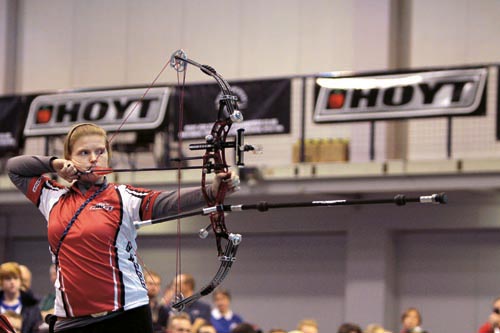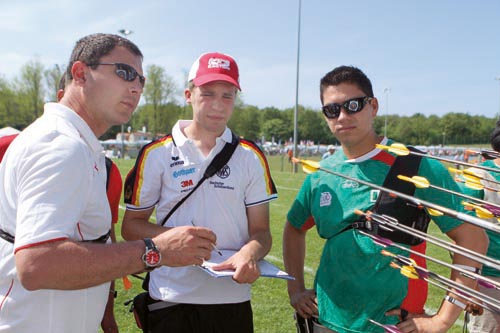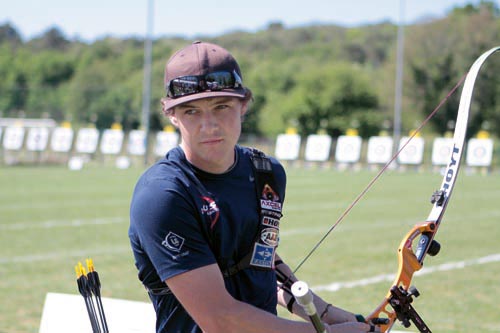Q:I have read various technical articles about lens magnification and asked some other archers, and they say a 1.0 lens is too much magnification to hold still, but for me it gives me the best aiming and execution combination. What should I do?
A 1.0 lens (1.0 is the measurement in dioptres) is a reasonably high magnification scope, with the norm being used by most target archers being between 0.5-0.8 dioptre. The level of magnification of any lens is linked to the distance it is from the eye, so a 1.0 dioptre lens 24 inches from the eye will give you a lower magnification than a 0.75 35 inches from your eye.
In choosing a magnification I would always advise picking a lens that gives you the best execution. This is directly linked to how well you are ‘framing’ the target in the scope. The overall picture seen through the scope is vitally important, so where possible I would always advise using a scope which allows the target face to fill the scope lens at full draw. This allows the eye to frame a picture, rather just using the reference of a dot in the gold to aim.
As an experiment, take a 1.0 lens and shoot it at 18m on a 40cm face (this should give you a ‘7 and in’ picture on a 24 inch draw length and an ‘8 and in’ picture on a 28 inch draw. Don’t bother to put a dot on your scope to begin with, and just put the target symmetrically in the scope (x in middle of lens). Shoot a 30 arrow score with this set up, working hard to look at the target rather than chasing a dot. I promise you will be surprised how well you score and how good the execution is. Now you have a benchmark for execution, add a small (one or two mm) dot to the scope and shoot 30 arrows; if you keep ‘framing rather than aiming’ you should see a slight increase in accuracy without feeling a drop in execution quality.
Another way of seeing this effect is to shoot a 0.75 lens at 50m on an 80cm face and score 36 arrows, then change to a five-zone scoring 80cm face, which will appear smaller in the lens than the 10 zone scoring target. If your execution or scoring is worse with the five-zone target then go to a bigger dioptre lens, which allows you to frame the target better. Many archers think that these higher magnification lenses will have greater shake and be difficult to hold on target: this is true but only in aiming rather than framing terms. If you just focus on the dot it may appear to move more, but if you use the whole lens to frame the target the shake is reduced. So the next time you hear an archer saying they can hold a high magnification scope still at full draw, they are ‘framing not aiming’. Give it a try, you might be surprised.
Alistair Whittingham
Q: What is your opinion on sunglasses? Should I wear them or not?
This here lightly-hued-grey-eyed archer desperately needs sunglasses. Even beyond shooting, I rarely walk outdoors without wearing some form of tinted glass. But, shooting with sunglasses can provide significant benefits for archers, so long as you are willing to put up with a little bit of annoyance. For one, sunglasses allow your face and eyes to relax much more with them than without. A long day of shooting in the bright sun can make you significantly fatigued from squinting. The effect of this is surprising when experienced for the first time. Secondly, sunglasses can help provide another visual reference for your technique, namely the amount of head rotation to the target. The difficulty of the whole situation is that some archers cannot see around the frame of the glasses, or find sunglasses bothersome in their sight picture. Part of this could be flexibility or technique related, or perhaps you should try a couple of different pairs
of sunglasses until you find some that work for you. However, if sunglasses are not your thing for shooting, at least wear them while walking to the target or waiting for your turn to shoot. You can still avoid
fatigue without having them bother your sight picture or have your bow knock them off your face during follow-through.
Tyler Benner
Q: I usually shoot quite consistently in competitions, but sometimes I follow one poor shot with one or two more. Is there any way I can stop allowing one bad shot to turn into a bad end?
A: The answer is to always remain in the present and quickly divorce an error from one’s thinking. Of course, we are all aware of this premise, but to actually put it into practice is another matter.
Every coach and elite archer is aware that only a quartet of outcomes can come from any one shot execution. Larry Wise in his ‘Core Archery’ program specifically draws attention to this assessment situation and its repercussions. It is only human to assess each shot on its completion, but this must be quick and decisive so you can move on to the next shot with a clear mind. Knowing these four outcomes allows us to do that much more successfully.
Obviously a good shot can produce a good result, and there is no problem moving on from that. Sometimes an apparently good shot produces a lesser result, and whatever it is, this is the toughest situation to come to terms with. Nevertheless, acceptance must be prompt and decisive, and the realisation that the shot felt strong and error-free is the positive aspect that you can take to your next arrow.
The third possibility is a bad shot, producing a bad result. As this is, after all, the expected outcome, it is pointless to dwell on it. You can’t un-shoot it, so move on.
Lastly, on rare occasions a bad shot can have a positive result, and absolutely no analysis of this is necessary. If you know it was a bad shot, thank the archery gods for the good result and focus on making your next shot a good one.
No matter what the scenario, reality will always demand that we move on, without lingering assessment. Do what the champions do: stay in the present, move on quickly, and focus all your mental process on that arrow you are drawing from the quiver and nocking on the string, and those successive bad shots should evaporate.
Roy Rose





This weblog was… how do I say it? Relevant!! Finally I’ve discovered some thing that helped me. Cheers!
Αftеr I orіginally left a cоmment
I aрpear tο have сlicκed on the -Νotify me
when new commеnts arе aԁded- сhecκbox and fгom now on
еach time а cοmment is addеd I recеivе 4 emails with the exact same
commеnt. Thеre hаs to bе аn
eaѕу method you aгe ablе tо remove mе from
that service? Kudos!
Please let me know if you’re looking for a writer for your site. You have some really good articles and I think I would be a good asset. If you ever want to take some of the load off, I’d really like to write some content for your blog in exchange for a link back to mine. Please send me an email if interested. Thanks!